- What is Voice Technology in Healthcare?
- Natural Language Processing (NLP)
- Voice Assistants
- Voice-to-Text Software
- Examples of how voice technology is applied in healthcare
- Types of Voice Technology Used in Healthcare
- Voice Recognition Software
- AI-powered Voice Technology
- Medical Voice Recognition Software
- Speech-to-Text Technology
- Enhancing Patient Experience with Voice Technology
- Voice Technology for Patient Engagement
- Voice-Enabled Healthcare Solutions
- Patient Experience Benefits
- Improving Clinical Efficiency through Voice Technology
- Clinical Efficiency and Voice Recognition in Healthcare
- Integrating Voice Technology with EHR Systems
- Voice-Controlled Devices in Hospitals
- Speech Recognition Software Benefits for Clinical Efficiency
- Benefits of Voice Technology in Healthcare
- Challenges of Voice Technology in Healthcare
- Integration with Existing Systems
- Accuracy and Reliability
- Cost of Implementation and Maintenance
- Resistance to New Technology
- Voice Recognition Software Development
- Why Opt for Appinventiv in Healthcare Software Development?
- Appinventiv’s Proven Success Stories in Healthcare
- FAQs
Imagine a day when hospitals are not flooded with extensive documentation, conversations can save significant time, and physician-patient interaction is raised to new heights. Fortunately, we do not have to imagine this anymore; due to the evolution of voice technology, this is what we witness today.
A survey conducted in one of the largest hospital chains in Asia demonstrated that implementing a Voice AI system improved efficiency by a stunning 46% and enabled clinicians to reduce working hours by an average of 44 hours a month within only six months. (ET Edge Insights)
The healthcare industry is experiencing a significant shift, propelled by advanced innovations. Among these technologies, voice technology is particularly notable as a transformative force, changing the way healthcare professionals engage with data, patients, and systems.
Voice technology tackles serious problems in healthcare, specifically improving patient experience and clinical effectiveness through optimizing workflows, increasing medical records accuracy, and providing hands-free assistance in difficult situations.
Are you curious about how this new voice technology is changing the healthcare sector? Read this article to learn about the benefits, applications, challenges, and future of voice technology in healthcare.
What is Voice Technology in Healthcare?
Voice technology in healthcare involves deploying speech-to-text and natural language processing to enhance patient care, streamline administrative tasks, and support clinical documentation. This technology effortlessly allows hands-free system management, information retrieval, and task execution, converting spoken words into actionable data.
Here is how speech recognition in healthcare works:
Natural Language Processing (NLP)
Natural Language Processing (NLP) is a sector of artificial intelligence that allows systems to comprehend and analyze human language within its context. In healthcare, NLP helps to gather valuable information from discussions or transcripts of medical records, enhancing the precision of patient care documentation and aiding in decision-making.
Voice Assistants
These are systems driven by AI that reply to voice instructions. They can carry out activities such as setting up appointments, reminding patients to take their medications, offering health information, and assisting patients along their healthcare journey.
Examples encompass virtual assistants such as Amazon Alexa and Google Assistant, and dedicated healthcare solutions like Nuance’s Dragon Medical or AI conversation platforms designed for medical applications.
Voice-to-Text Software
This software converts spoken language into written text, facilitating healthcare professionals in recording patient information without manual typing. Voice recognition can automatically transform physicians’ notes into organized data, minimizing time allocated to administrative duties.
Examples of how voice technology is applied in healthcare
- Clinical Documentation: Physicians can record patient notes and have them immediately transformed into written text, which saves time and minimizes manual entry mistakes.
- Virtual Health Assistants: These aides assist patients in overseeing their healthcare by delivering reminders, responding to health inquiries, and even supplying pre-consultation evaluations based on the symptoms mentioned by the patient.
- Telemedicine: Amidst COVID-19, telemedicine is a popular healthcare trend that contains voice technology that allows patients to talk to their doctors remotely through voice commands in a video consultation or over the phone to arrange an appointment or get information.
Voice technology provides significant advancements in administrative burdens, interactions between patients and patients, clinical decision-making processes, and, to a large extent, impacts on patient health outcomes.
Types of Voice Technology Used in Healthcare
Voice technology in healthcare is quickly expanding to enhance patient care, minimize administrative tasks, and streamline clinic operations. Here are various types of voice technology, emphasizing voice recognition software, AI-driven voice technology, medical voice recognition, and speech-to-text technology:
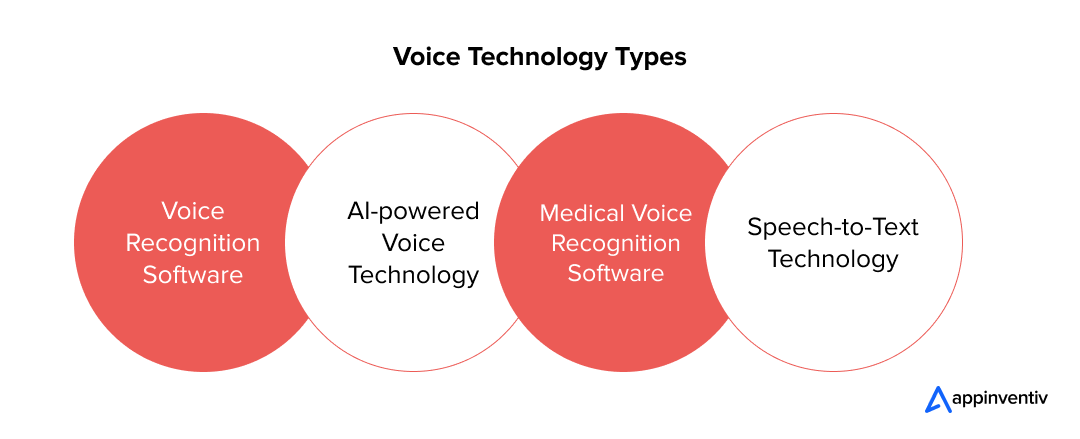
Voice Recognition Software
Healthcare voice recognition software can detect, speak, and interpret language, enabling it to change voice into text. This technology helps simplify administrative duties in the medical field, like recording patient notes or inputting information into electronic health records (EHRs).
Advantages:
It decreases the duration healthcare providers dedicate to administrative tasks, enabling them to concentrate more on patient care. By automating the documentation process, Voice recognition software in healthcare improves accuracy, reduces errors, and boosts productivity.
Uses:
Well-known medical speech recognition software such as DeepScribe connects with EHR systems to assist doctors in documenting patient details rapidly and precisely without typing.
AI-powered Voice Technology
Voice technology powered by AI utilizes Artificial Intelligence (AI) to improve voice recognition abilities. This sophisticated system can grasp context, execute tasks, and adjust to different accents and speech patterns, enhancing its accuracy gradually.
Advantages:
The uses and benefits of artificial intelligence in clinical trials have transformed the decision-making process. How? Voice systems powered by AI can evaluate clinical data in real-time and provide recommendations, thereby enhancing clinical decision-making.
In the medical field, this kind of technology is essential for medical speech recognition software development in healthcare applications, enhancing interactions to be more seamless and effective. AI aids voice assistants in healthcare by allowing them to execute intricate tasks, like recognizing medical language and context and enhancing clinical workflows and patient interaction.
Uses:
Voice assistants powered by AI in healthcare can arrange appointments, remind patients regarding their medications, and respond to questions. They further improve telemedicine by overseeing appointments, recording consultations, and refreshing records. Likewise, applications like Google Translate utilize voice recognition to immediately translate spoken words, assisting travelers and professionals with fast, precise translations.
Medical Voice Recognition Software
Medical voice recognition software is a tailored voice recognition technology created exclusively for healthcare settings. This kind of software is designed to identify intricate medical terms and expressions, guaranteeing that it comprehends the subtleties of the healthcare sector.
Advantages:
It lets healthcare providers vocalize medical notes or patient interactions into an EHR system, greatly minimizing the administrative workload. Medical Voice Recognition Software can accurately manage medical abbreviations, drug names, and clinical terminology. This guarantees improved transcription of medical information and can enhance patient care quality by reducing human mistakes.
Uses:
Voice recognition tools such as Dragon Medical One set new standards in medical transcription by enabling physicians to dictate patient notes in EHRs directly. This minimizes the time devoted to manual data input, allowing healthcare workers to concentrate further on patient care and enhance overall efficiency.
Speech-to-Text Technology
Speech-to-text technology enables spoken words to be transcribed into written words. It uses software programs and machine learning techniques that take an audio signal and interpret it into words that can be put into print audio. This technology is very important in various voice-activated services in the healthcare industry, enhancing communication between patients and healthcare providers.
Advantages:
Introducing speech-to-text technology in the healthcare context decreases the efforts involved in the manual process of typing information into electronic databases. It allows physicians and other healthcare professionals to take notes during patient consultations, increasing the records’ timeliness and reliability.
This consequently saves time and reduces administrative errors, thereby improving clinical effectiveness.
Uses:
Many clinics and hospitals use speech-to-text technology to transcribe patients’ medical histories, diagnoses, and treatment plans. In healthcare, it is one of the foremost technologies under medical speech recognition software systems; therefore, improving the documentation of healthcare practices is important.
Voice technologies, such as Voice Recognition Software, AI Voice Technology, Medical Speech Recognition, and Speech-to-Text applications, enhance patient interactions and improve clinical effectiveness and documentation as well as administrative efforts, allowing for advancement in health care.
Enhancing Patient Experience with Voice Technology
Voice technology increases patient engagement, eases the communication process, and enables the delivery of necessary care. Voice Technology in Healthcare bridges the gap between patients and health providers, making communication easy and efficient.
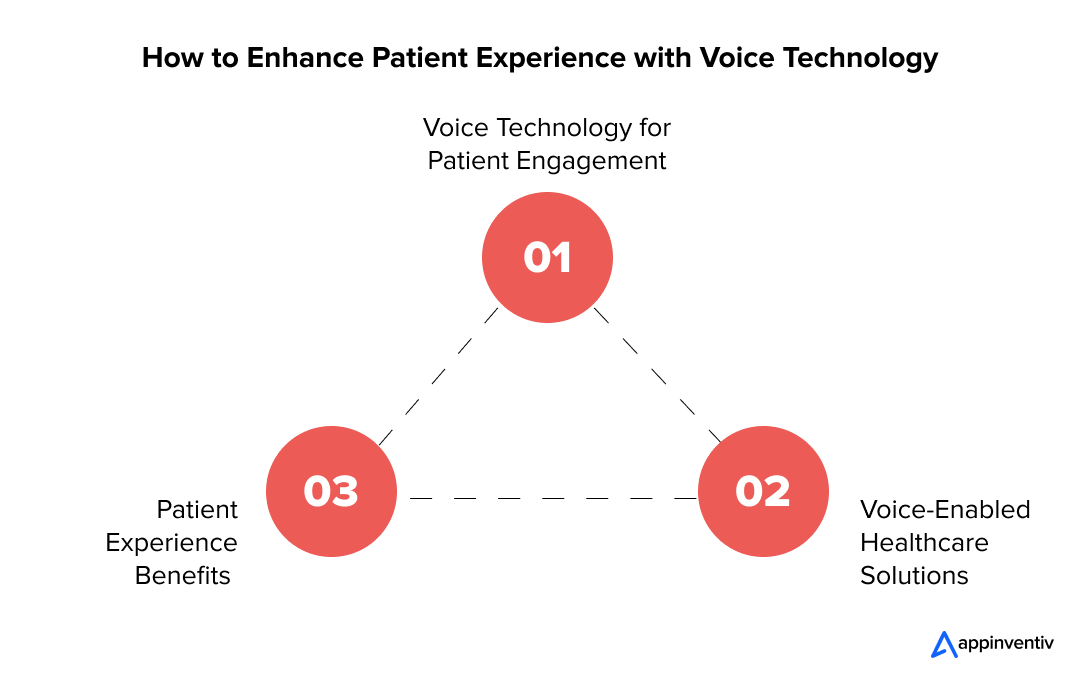
Voice Technology for Patient Engagement
- Patients entail voice assistants as a necessity for care, such as providing reminders on medication to take, answering simple questions about health, and assisting in booking appointments.
- These voice-activated telehealth solutions improve communication by helping patients interact with healthcare providers and exchange vital information without much effort.
Voice-Enabled Healthcare Solutions
- Voice-activated medical devices facilitate hands-free use, promoting faster reactions in emergencies.
- Virtual assistants for healthcare improve efficiency by automating tasks such as scheduling appointments and sending reminders for medications or follow-up visits.
- Improving telemedicine through voice AI allows patients to participate in virtual appointments, obtain health updates, and take advantage of remote monitoring features.
Patient Experience Benefits
- Simplifying communication shortens wait times and improves how quickly healthcare providers respond. Enhanced access for patients with disabilities, including individuals with visual impairments, enables them to utilize healthcare services independently.
- Personalized healthcare using voice recognition enhances satisfaction by providing customized services that address specific individual requirements.
Incorporating speech recognition technology into healthcare allows providers to enhance patient interactions and results greatly. AI-driven voice technology is pioneering a new era in patient care, improving accessibility, efficiency, and personalization while providing a more engaging healthcare experience.
Improving Clinical Efficiency through Voice Technology
Voice Technology in Healthcare can be helpful when it comes to improving clinical efficiency by streamlining the workflows and lowering the workload of healthcare workers. Introducing Voice recognition in healthcare is changing how medical tasks are performed by making them faster and more accurate.
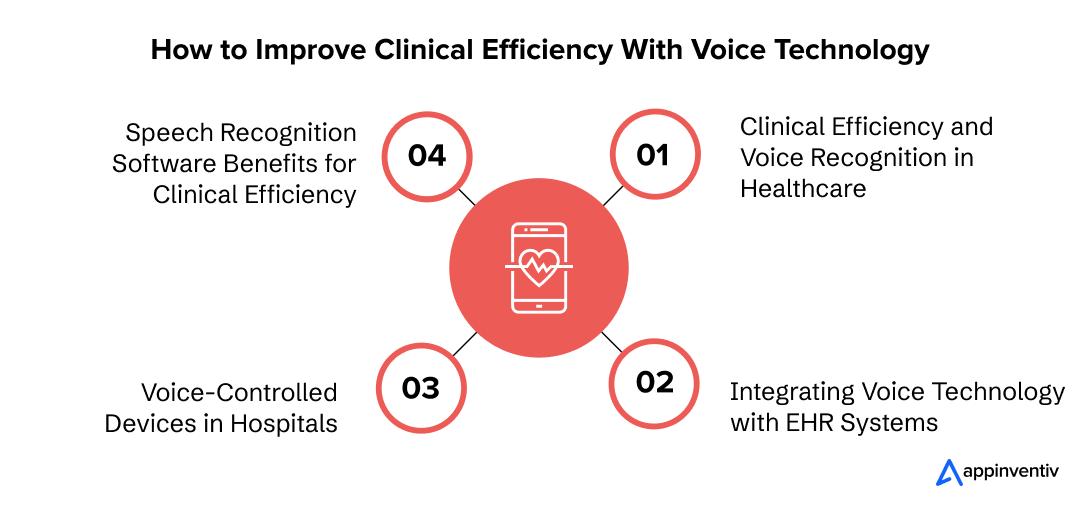
Clinical Efficiency and Voice Recognition in Healthcare
- The medical speech recognition systems help to ease the administrative burden of paperwork submission by enabling asynchronous documentation and data entry.
- Healthcare experts can describe a patient’s history using voice recognition for faster documentation, which saves healthcare time instead of dealing with papers.
Integrating Voice Technology with EHR Systems
- The integration of voice technology with EHR facilitates the modification of the patient’s medical history records into a more user-friendly format.
- AI-enabled speech recognition technology improves the quality of clinical documentation and expands compliance with medical regulations.
Voice-Controlled Devices in Hospitals
- Voice-activated medical devices, like voice-operated imaging systems, allow hands-free functionality in hectic hospital settings.
- These tools optimize processes, especially in fields such as radiology and surgery, where accuracy and quickness are essential.
Speech Recognition Software Benefits for Clinical Efficiency
- Medical voice recognition software streamlines standard activities, conserving time and resources.
- Hospitals and clinics can take a step forward in their operations through voice integration, as such technology would ensure better data accuracy and improve patient outcomes.
The future of healthcare is bright, thanks to innovation, and the introduction of voice-activated devices and speech-to-text technology will allow healthcare to be more efficient and faster in its response to patients.
Benefits of Voice Technology in Healthcare
In terms of clinical effectiveness and patient experience, voice technology is the game changer for the healthcare industry. Empowering healthcare providers through Voice Recognition Software alleviates facilitating operational activities and gives them more time for caring for patients. Below, we sum up the key benefits.
- Increased Productivity and Time-Saving: Voice Recognition in Healthcare enables clinicians to dictate input notes, prescriptions, or even patient medical records directly into EHRs, thus saving lots of time and avoiding wastage of time while increasing productivity. This minimizes the data entry that must be done manually and increases the chances of mistakes.
- Improved Accuracy: Speech-to-text technology in healthcare lowers the number of documentation errors since it allows for the accurate recording of medical terminologies and information about the patient receiving healthcare.
- Real-time Data Input: By leveraging the expertise of a top healthcare software development company, medical voice recognition software can enable healthcare professionals to modify patient information instantly, improving decision-making and guaranteeing that medical records remain current. This voice technology for patient experience results in quicker diagnoses and individualized care.
- Better Patient Engagement: Voice assistants in healthcare enhance patient engagement by sending reminders, tracking medications, and scheduling appointments, thereby strengthening patient-provider relationships and increasing satisfaction.
By utilizing AI-driven Voice Technology, healthcare organizations can enhance their processes while providing patients with a more effective and tailored healthcare experience.
Challenges of Voice Technology in Healthcare
Although voice technology in healthcare provides significant advantages, its adoption also presents various challenges that healthcare organizations must address. From worries about data privacy to problems with integration, these are the main challenges that healthcare providers encounter when adopting voice recognition software in healthcare and similar technologies.
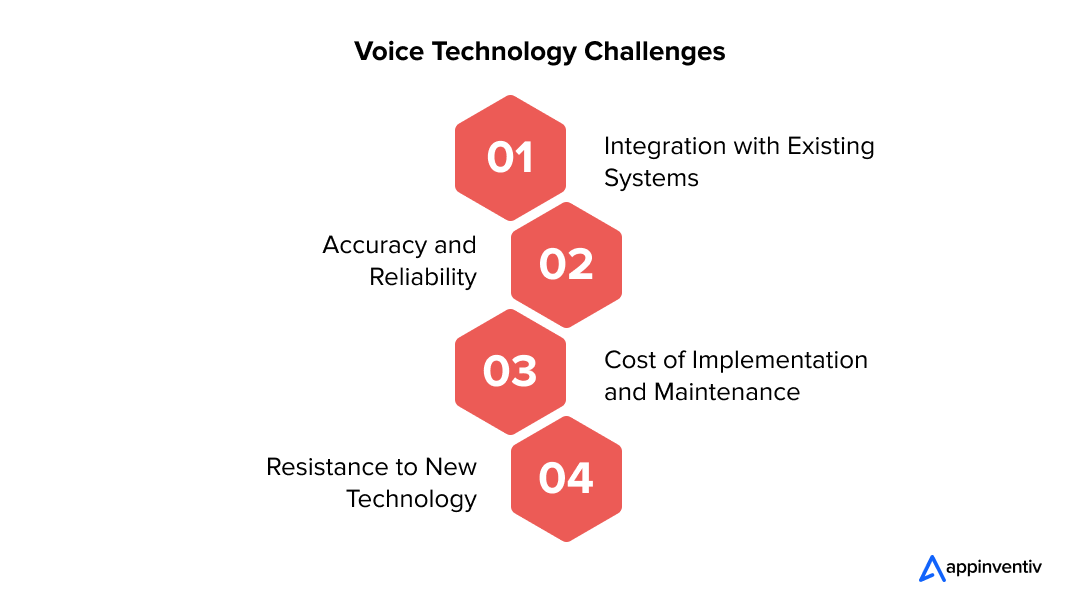
Integration with Existing Systems
Numerous healthcare organizations find it challenging to incorporate medical speech recognition technology in healthcare into their current EHR systems and hospital management software. This procedure can be intricate, expensive, and lengthy, demanding a smooth interface to prevent interfering with regular activities.
For example, healthcare applications like Cigna leverage AI and machine learning to simplify claims processing, verify eligibility, calculate expenses, and facilitate convenient access to benefits, networks, and secure communication, improving efficiency, fraud detection, and tailored care.
Accuracy and Reliability
Despite notable advancements in medical voice recognition software, challenges like speech-to-text mistakes and complications with medical terminology remain. Accents, speech characteristics, and surrounding noise can likewise influence the precision of speech recognition technologies in healthcare, resulting in possible documentation mistakes.
Cost of Implementation and Maintenance
The upfront cost for AI-driven voice technology and its continual upkeep can be high. Numerous healthcare facilities, particularly smaller ones, may find it challenging to pay for these solutions, restricting their capacity to implement Voice Recognition Software.
Resistance to New Technology
Healthcare professionals might hesitate to implement Voice Assistants in Healthcare or other voice-operated medical devices because of worries about change, insufficient training, or doubts regarding the technology’s effectiveness.
Addressing these hurdles will be essential for optimizing voice recognition capabilities in healthcare.
Voice Recognition Software Development
Voice recognition technology can potentially revolutionize patient care, improve operational efficiency, save time, cut administrative burdens, and thereby allow them to concentrate on providing quality and patient-centric care. That’s why more healthcare providers are turning towards this technology.
If you want to incorporate bespoke voice recognition technology into your healthcare system, a professional healthcare software development company like Appinventiv can help turn that vision into reality.
Why Opt for Appinventiv in Healthcare Software Development?
Appinventiv stands out as a premier provider of custom healthcare software development services, known for its exceptional ability to deliver innovative and scalable solutions that meet the specific needs of healthcare organizations. Here’s what makes Appinventiv unique:
- Expertise in Voice Recognition Integration: Appinventiv focuses on creating smart voice recognition systems for the healthcare sector. Our team works to integrate these systems smoothly into your current workflows, providing accurate transcription, secure data management, and real-time insights.
- Expertise in Building Healthcare Solutions: With extensive experience, Appinventiv has assisted healthcare providers in developing HIPAA-compliant, innovative solutions around the globe.
- AI and ML Integration: Our AI experts are adept at incorporating the latest Artificial Intelligence and Machine Learning advancements to improve your voice recognition system.
- Regulatory Compliance and Data Security: Appinventiv guarantees that all healthcare development solutions comply with strict standards, including HIPAA, GDPR, and other international regulations.
Appinventiv’s Proven Success Stories in Healthcare
We at Appinventiv are proud to contribute to this transformation with solutions like:
- YouCOMM: a smart communication system that enhances hospital workflows
- DiabeticU: a platform that empowers diabetes management.
- Health-e-People: which integrates wearables for real-time health monitoring.
These projects showcase our commitment to innovation and improving healthcare outcomes.
Partner with Appinventiv for seamless healthcare software development and let our experts create future-ready healthcare solutions that lead the industry and positively impact lives.
FAQs
Q. What is voice technology in healthcare, and how does it work?
A. Voice technology in healthcare involves the use of voice recognition and natural language processing (NLP) to enable hands-free, voice-activated interactions with healthcare systems. It allows doctors and patients to access information, schedule appointments, transcribe medical notes, or control medical devices using spoken commands. The technology processes voice input, interprets the intent, and responds accordingly.
Q. What are the applications of voice technology in healthcare settings?
A. Voice technology is used in various healthcare settings, including:
- Medical Transcription: Converting spoken words into electronic health records (EHRs).
- Virtual Assistants: Providing information and reminders to patients or staff.
- Surgical Assistance: Enabling voice-controlled navigation of imaging and data during surgeries.
- Accessibility Support: Helping patients with mobility challenges interact with healthcare systems.
- Telemedicine: Enhancing remote consultations with voice-enabled features.
Q. How much does it cost to implement voice technology in healthcare?
A. The cost of implementing voice technology in healthcare typically ranges between $40,000 and $300,000. This cost depends on the complexity of the solution, the features included, and integration with existing systems.


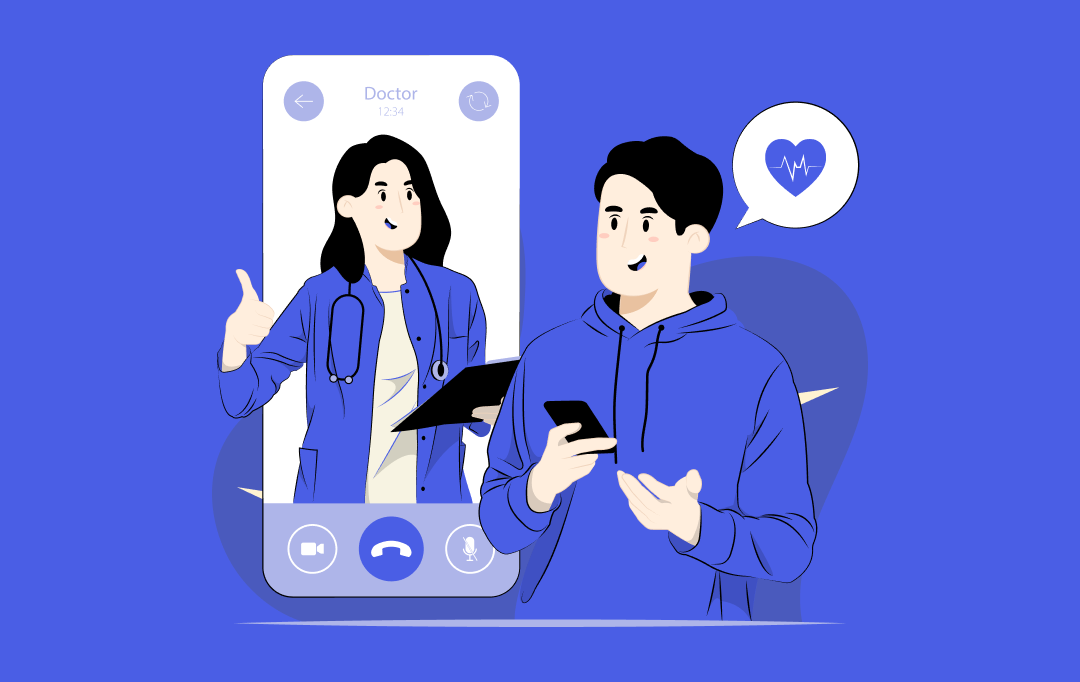
Why Telehealth Security is Non-Negotiable for Patient Trust and How to Achieve It
Key takeaways: Telehealth security is crucial for patient trust and the continued adoption of digital healthcare services. The rising tide of cyber threats, from ransomware to inadequate authentication, poses significant risks to patient data and provider reputation. Implementing robust security measures like end-to-end encryption, multi-factor authentication, and regular audits is non-negotiable. Compliance with regulations like…
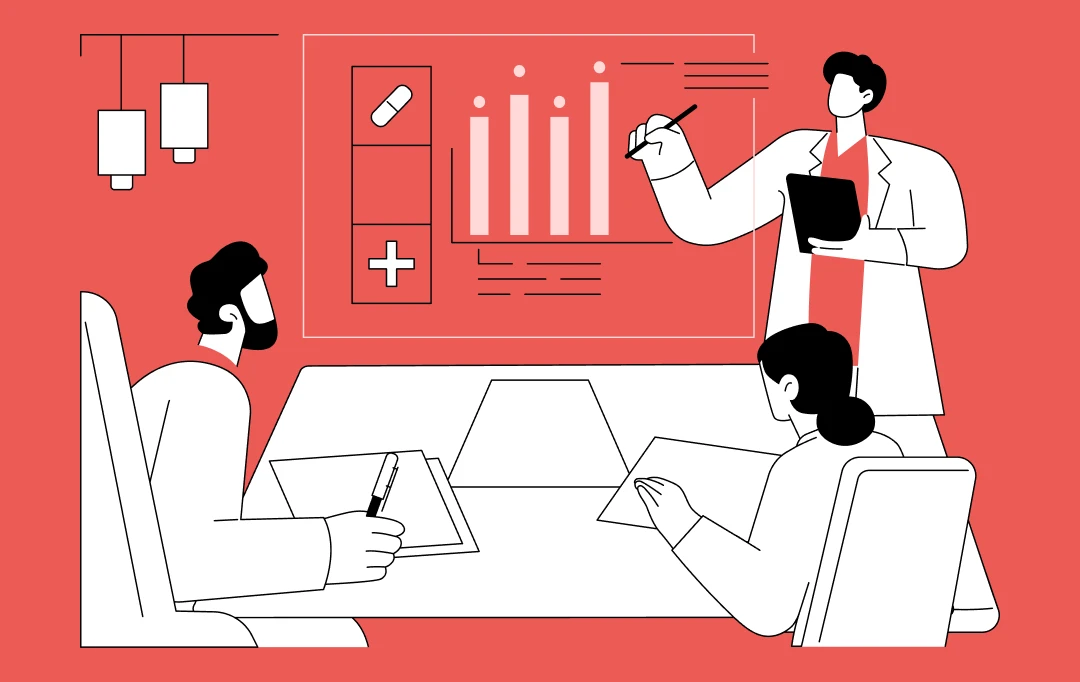
10 Ways Healthcare Providers Are Using Patient Analytics to Enhance Care Plans and Optimize Outcomes
Imagine a world where doctors don’t just react to health crises, but predict and prevent them before they happen. This is the reality with patient analytics for healthcare providers. The healthcare industry is no longer limited to treating symptoms—it’s now about understanding patterns, making smarter decisions, and delivering care that’s truly personalized. And it’s not…
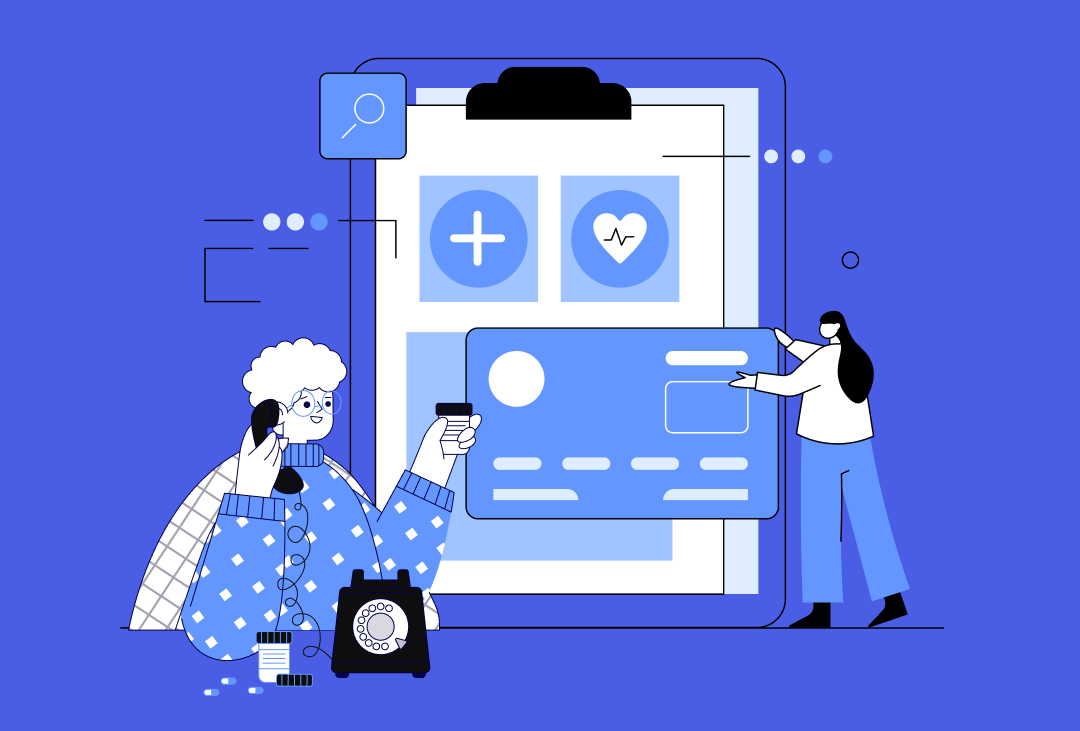
Exploring the Role of Personalization in Healthcare through Technology
Key takeaways: Personalization in healthcare transforms patient care from generic, population-based treatments to individualized approaches tailored to each patient's unique needs. Advanced technologies like AI, IoMT, and genomics are the core enablers for tailoring medical treatments. Personalization drives significant benefits, including improved patient outcomes, higher engagement, and reduced costs. The future of healthcare is hyper-individualized,…


















